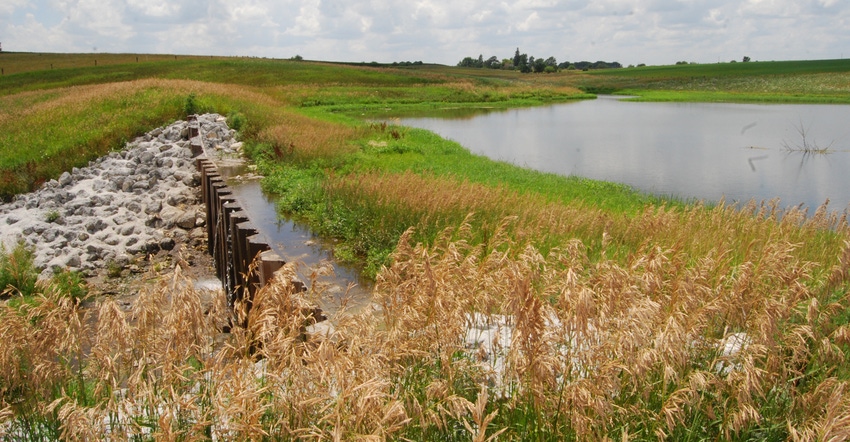March 22, 2018

By Jamie Benning
Working within watersheds is the most effective way for communities to come together to reduce flood risk and improve water quality in Iowa.
Clear Creek Watershed in Johnson and Iowa counties is one of nine watersheds participating in the Iowa Watershed Approach project, a statewide $96.9 million flood reduction and water quality improvement project funded by the Department of Housing and Urban Development that began in 2016. Landowners in this watershed have an opportunity to implement conservation practices on their farms that will reduce downstream flooding as well as improve water quality.
“This project is such a great opportunity to work as part of a collaborative team,” says John Rathbun, project coordinator. “I have met so many great people who are excited about being a part of the overall project, from their land to the watershed to the state and beyond.”
Practices prioritized for cost share
Landowners in selected areas of the Clear Creek Watershed will be offered the opportunity to implement in-field and edge-of-field conservation practices to reduce flood potential and decrease nutrient concentration in surface water.
Practices such as water and sediment control basins, floodplain restoration, oxbow restoration, ponds, terraces and wetlands will be prioritized to receive 75% cost-share funds. Practices eligible for cost share, but with lower priority, include conservation cover, contour buffer strips, denitrifying bioreactors, grade stabilization structures, grassed waterways, filter strips, prairie strips and saturated buffers.
Rathbun says he is excited to be helping landowners to further their conservation work in the watershed and to work with the Iowa Watershed Approach partners and the Johnson County Soil and Water Conservation District.
Building relationships
Over the next three years, the Clear Creek Watershed Coalition will dedicate $3.1 million to install about 72 practices in the watershed. Since the project is funded through HUD, practices that hold surface water and release it slowly will receive priority to help reduce flood damages in the future.
Before becoming project coordinator, Rathbun was a landscape designer assisting homeowners with the design and construction of stormwater management practices. This experience will help him build the relationships with project partners and landowners to meet the goals of the project.
Rathbun is already actively engaging community members, landowners and other stakeholders to raise awareness and gather input. In January, the Clear Creek Watershed project held two landowner information meetings to kick off the implementation phase of the project. Forty-four landowners attended those meetings and several followed-up with Rathbun to see how they could get involved. Construction on the first projects will likely begin this fall and run through 2020.
Approach brings effort together
Partners in the Iowa Watershed Approach project include the Iowa Economic Development Authority; Homeland Security and Emergency Management; University of Iowa; Iowa State University; University of Northern Iowa; Iowa Department of Natural Resources; Iowa Department of Agriculture and Land Stewardship; the cities of Coralville, Dubuque and Storm Lake; and Benton, Buena Vista, Fremont, Iowa, Johnson, Mills, Winneshiek and Howard counties.
Successful watershed projects need to be sustained over a long time. A multi-decade Clear Creek Watershed plan is being developed. Public surveys and landowner and community listening sessions will help to inform the plan’s development.
For more information on upcoming events or to participate in community listening sessions, visit clearcreekwatershedcoalition.org. Or contact John Rathbun at the Johnson County SWCD at 319-499-4835 or [email protected].
Benning is water-quality program manager for ISU Extension. Contact her at [email protected].
You May Also Like




